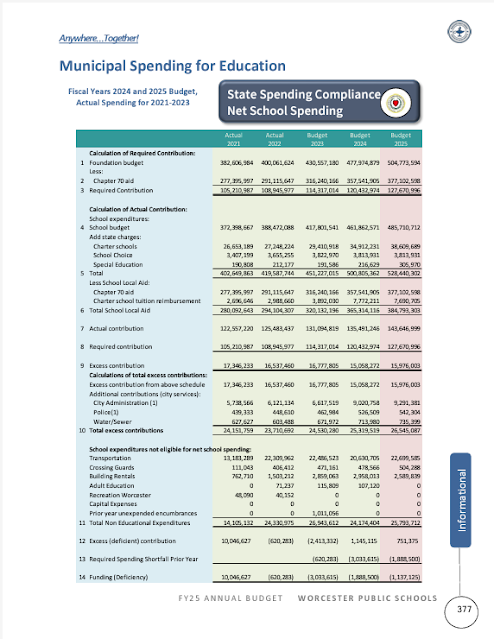They were due Friday, but I only got through them yesterday. Debate doesn't begin until Monday, though, so you still have time to contact your Senator's office to enlist their endorsement. As the Senate sorts their amendments by topic, you can find all the education-related ones here.
As per usual, if you're looking for earmarks, you're on your own: these are ones that impact more than one district and in K-12. Opining, as per usual, is entirely mine.
Also there are several "let's have a foundation budget review!" amendments, which I am going to give their own blog post.
On inflation:
Amendment 743 just straightforwardly adds the $217M (Thank you, Senator Moore!) which is the amount the jointly endorsed MASC/MASS/MTA/AFT-MA solution would cost.
Amendment 758 puts in $100M for "inflation relief," though it specifies that it would not go into base aid in future years, which rather misses the point.
The rest of these don't fix anything for this year:
Amendment 735 would establish an escrow bank, where any year where inflation was over 4.5%, the difference would be "banked" to be distributed in years when it was less.
Amendment 644 uses the calculation requested, but starts it in 2026.
Amendment 798 uses the calculation requested, and, while it doesn't specify 2026, since it conflicts with the language the budget outlines, per Section 3, it wouldn't go into effect this year.
Other Chapter 70 and core aid related things:
Showing his usual zest for amendment, Senator Tarr has submitted Amendments 615 for $125, 618 for $120, and 619 for $110 per pupil minimum aid. And this is your ongoing reminder that every increase makes it more likely that fewer districts will escape hold harmless during the implementation of SOA remaining, and that this funding has no relation to student or municipal need.
Amendment 666 is chapter 70 "extraordinary relief" of $18.5M, targeted only at places where the required local contribution is more than 30% of local revenue
Amendment 799 is $5M in relief "municipalities who rank in the lowest 10% of municipalities in both of the following categories: (i) total per-pupil dollar expenditure; and (ii) actual net school spending." This means it won't be the highest need districts, as those have required per pupil expenditures that are higher.
School choice:
Amendment 720 would raise the per pupil amount of a school choice student from $5000 to $7500.
Rural aid:
Amendment 631 would raise it from $15M to $17.5M
METCO:
Amendment 635 would raise it from $29.4M to $33M and would also allow funds to be carried to the following December
Charter school facilities:
Amendment 709 would raise the charter school facilities per pupil amount (which comes from a sending district's Chapter 70 aid) to $1288 from $1188
Regional transportation:
Amendments 623 would raise it to $106.5; 661 and 734 and 748 to $121.1M
Special education and circuit breaker:
Amendment 705 would phase in circuit breaker being 100% reimbursement of the "extraordinary" costs, with 75% for FY25 moving to 80% in FY26, 90% in FY27, 95% in FY28, and 100% in FY29, but would immediately put 100% into place for any children whose parents or guardians do not reside in Massachusetts or who are placed outside their hometown.
Amendment 639 would study the delivery of special education services
Vocational:
Amendment 611 would move the CTE line from $2.5M to $3.5M; 711 to $4.5M
Amendment 663 would move transportation reimbursement for out of district vocational from $1M to $2M
Amendment 751 would require a vocational admissions lottery
Amendment 752 would create vocational annexes to comprehensive high schools in cities
Amendment 755 would create a commission on such annexes
Advanced Placement:
Amendment 622 would increase the AP math and science line from $2M to $3.3M
Amendment 654 would require state colleges and universities to take an AP score of 3, 4, or 5 for credit
Early college:
Amendment 708 would take the early college line from $3M to $3.5M
Amendment 731 would create a five year strategic plan on early college in the state
Sex ed
Amendment 756 would require biannual collection of sex education in districts in the Commonwealth
Early literacy:
Amendments 687 and 780 would raise the "Literacy Launch" amount from $10M to the $30M that would match the Governor and House
Amendment 787 is the terrible literacy bill that would mandate curriculum be taken from a state list
SEL:
Amendment 640 would increase the SEL line from $6M to $8M
School to career:
Amendment 714 would increase the school to career line from $7.3M to $8.5M
After and out of school:
Amendment 665 would increase the budgeted $8.6M to $10.6M
Diversity in education:
Amendment 689 would student the impact of layoffs of this year and last on teachers of color
MSBA:
Amendment 760 adds "collaboratives" to the study of the MSBA that the Senate included in the outside section (starts on page 67)
Trusts:
Amendment 621 would increase the civics trust from $1.5M to $2.5M
Amendment 750 would increase the genocide trust from $2.25M to $3M














